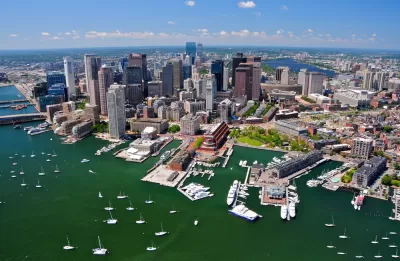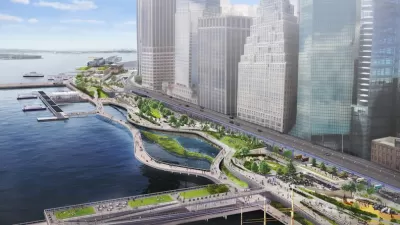Intrigue continues for waterfront development plans in Boston and nearby cities.

Jon Chesto and Danny McDonald report: "Acting Mayor Kim Janey dealt developer Don Chiofaro’s long-planned waterfront skyscraper a massive setback on Thursday, by withdrawing a plan for development along a stretch of Boston Harbor that would have allowed construction of the 600-foot tower steps from the New England Aquarium."
The plan in question is the Downtown Municipal Harbor Plan, which was "crafted four years ago after lengthy negotiations overseen by Mayor Martin J. Walsh’s administration," according to the article.
Mayor Janey pulled the plan from consideration by the state's environmental regulators after facing pressure from environmental groups and rivals in the mayoral election. In a statement announcing the decision, Janey said that the plan failed to adequately address neither equity nor climate resilience. "In particular, she focused on threats from sea level rise and extreme weather, an issue that has grown in urgency since the harbor plan was approved by the Boston Planning & Development Agency in 2017," according to the article.
The harbor plan sets out some building rules and restrictions for a 42-acre section of the waterfront, running from Long Wharf to the Evelyn Moakley Bridge. Its key feature for Chiofaro’s much-debated tower proposal would override state rules that cap the height of buildings in state regulated tidelands, such as those along the downtown waterfront. Without the new zoning allowed through the harbor plan, Chiofaro would essentially be limited to a building of roughly 150 feet, a height he says would make the project economically unfeasible.
As detailed in the article an April ruling Suffolk Superior Court judge casted doubts on the plan. The ruling came in response to a lawsuit by the Conservation Law Foundation and residents of the nearby Harbor Towers. "But the ruling also potentially endangered 16 other municipal harbor plans along the state’s coastline, which had been approved in a similar fashion over the years." That ruling is now under appeal and the state's Department of Environmental Protection is "revising its waterfront rules to ensure these harbor plans comply with the law."
FULL STORY: Citing equity, climate concerns, Janey scraps harbor zoning plan

Planetizen Federal Action Tracker
A weekly monitor of how Trump’s orders and actions are impacting planners and planning in America.

Maui's Vacation Rental Debate Turns Ugly
Verbal attacks, misinformation campaigns and fistfights plague a high-stakes debate to convert thousands of vacation rentals into long-term housing.

San Francisco Suspends Traffic Calming Amidst Record Deaths
Citing “a challenging fiscal landscape,” the city will cease the program on the heels of 42 traffic deaths, including 24 pedestrians.

Amtrak Rolls Out New Orleans to Alabama “Mardi Gras” Train
The new service will operate morning and evening departures between Mobile and New Orleans.

The Subversive Car-Free Guide to Trump's Great American Road Trip
Car-free ways to access Chicagoland’s best tourist attractions.

San Antonio and Austin are Fusing Into one Massive Megaregion
The region spanning the two central Texas cities is growing fast, posing challenges for local infrastructure and water supplies.
Urban Design for Planners 1: Software Tools
This six-course series explores essential urban design concepts using open source software and equips planners with the tools they need to participate fully in the urban design process.
Planning for Universal Design
Learn the tools for implementing Universal Design in planning regulations.
Heyer Gruel & Associates PA
JM Goldson LLC
Custer County Colorado
City of Camden Redevelopment Agency
City of Astoria
Transportation Research & Education Center (TREC) at Portland State University
Jefferson Parish Government
Camden Redevelopment Agency
City of Claremont





























